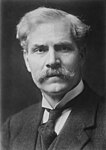| |||||||||||||||||||||||||||||||||||||||||
All 74 Scottish seats to the House of Commons | |||||||||||||||||||||||||||||||||||||||||
|---|---|---|---|---|---|---|---|---|---|---|---|---|---|---|---|---|---|---|---|---|---|---|---|---|---|---|---|---|---|---|---|---|---|---|---|---|---|---|---|---|---|
| |||||||||||||||||||||||||||||||||||||||||
 Results of the 1924 election in Scotland for the county and burgh seats Unionist Labour Liberal Scottish Prohibition Party | |||||||||||||||||||||||||||||||||||||||||
A general election was held in the United Kingdom on Wednesday 29 October 1924, as a result of the defeat of the Labour minority government, led by Prime Minister Ramsay MacDonald, in the House of Commons on a motion of no confidence.[1] It was the third general election to be held in less than two years. Parliament was dissolved on 9 October.[2] Scotland was allocated 74 seats in total, with 71 territorial seats (32 burgh constituencies and 38 county constituencies)[c] which voted using the first past the post voting method, and one university constituency, which elected an additional 3 members using the Single Transferable Vote (STV) method.[3] As voters in university constituencies voted under a different system, and in addition to their territorial vote, the results are compiled separately. All 74 seats were contested.
In Scotland the election saw both the Labour Party and the Unionists gain votes at the expense of the Liberals. Labour were slightly (0.4%) ahead of the Unionists in terms of votes cast, however the Unionists managed to secure 12 more Scottish seats than Labour, winning 38 seats in total. The Scottish Liberals saw an 11.8% swing against them and lost more than half their seats to finish third. The only other party represented in parliament from Scotland was the Scottish Prohibition Party, who retained their only seat in Dundee.
When combined with results from across the UK, the Conservatives (with whom the Unionists alligned at Westminster) led by Stanley Baldwin obtained a large parliamentary majority of 209. Labour lost 40 seats. The Liberal Party, led by Asquith, lost 118 of their 158 seats which helped to polarise British politics between the Labour Party and the Conservative Party.
Cite error: There are <ref group=lower-alpha> tags or {{efn}} templates on this page, but the references will not show without a {{reflist|group=lower-alpha}} template or {{notelist}} template (see the help page).
- ^ Graper, Elmer D. (1925). "The British Election". American Political Science Review. 19 (1): 84–96. doi:10.2307/2938896. ISSN 0003-0554. JSTOR 2938896. S2CID 145751193.
- ^ "Parliamentary Election Timetables" (PDF) (3rd ed.). House of Commons Library. 25 March 1997. Retrieved 3 July 2022.
- ^ "Research Briefing: Voting systems in the UK". Library of the House of Commons. 10 January 2023. Retrieved 26 November 2024.



